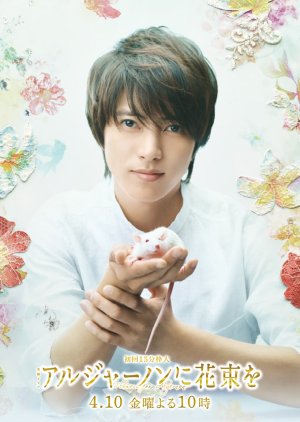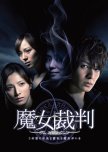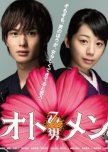
I'm writing this few moments after finishing the last episode, while crying still, so forgive me if I'm not 100% rational and non biased. I can say for sure that this is one of the most emotional dramas I've ever seen. It's a beautiful story about friendship, love, human value, ethics and morals.
Although it's a sci-fi show, it totally reflects reality and behavior of human beings under certain circumstances and shows pretty realistic relationships between 'non equal' humans. For those who like psychology, there is a great deal of it in this show as well. For those who like character development, strong emotions, all mixed together, this drama is 100% must see.
I have no heart to criticize anything about this show at the moment, because I feel like I just got off the roller coaster of emotions I will never forget. Good points are too strong to let me pay attention to the minor flaws, so I'll just finish positively, like I started.
I don't know if I will be rewatching this, it feels like I won't forget it so soon, so maybe sometime in the future, and I'm sure I will equally enjoy it.
Once again, I hope the subs will be done soon, because it's a shame not to let everyone enjoy this amazing show till the end. Subs for Algernon, he deserves it <3
Was this review helpful to you?

Ironically, it had been sitting in my ptw list for a good year, waiting - so I thought - for me to be in the right mood for its somehow heavy subject. It came as a big surprise that this was the perfect moment and Algernon ni Hanataba wo is the show that finally reminded me why I fell in love with Asian dramas in the first place and became an addict so many years ago.
It enchanted me and pulled me into its world five minutes in. I hadn't even realized I was marathoning with bated breath until I exhaled.
The show is built on two different levels: the plot itself with its events and the story told by the characters. These two levels aren't of equal importance, that is, if you watch for the events it may disappoint you, as it suffers from the typical Japanese brevity and sudden, unexpected turns. However, this drama is meant to be valued for the thoughts it provokes and the way it does so, hence my perfect mark.
I won't lie, it made me cry. A lot.
This is a beautifully heart-wrenching story of diversity and the need to conform, be 'equal'. While most of us aim at being smart enough to earn more, have success in life and even wallow in our self-esteem, Sakuto dreams of becoming intelligent for the people around him to love him. This makes his journey all the more tragic, since it inevitably raises the question whether he was happier when only half cognizant of his surrounding or when he fully grasped the meaning of everyone's motivations and finds out that being a genius can be a sentence to loneliness. It also heavily probes on the benefits of intelligence when it's attained at the cost of humanity, empathy, compassion and even love.
I believe each single character in this drama has a precise purpose in terms of typecasting the different approaches to what is generally considered 'normal'. Here's a word I hate when referred to human beings, but it is the core of this tale, in its literal meaning of 'conforming to the norm'. This means that all the characters revolving around Sakuto find their justification only in connection with him, they represent the wide range of 'normality' as opposed to the extremes Sakuto's going to experience.
Which is not to say that they didn't act well. Quite the opposite: what fascinated me here is the fact that each actor played its part in a different way, according to his/her role in Sakuto's life. The same can be said about the direction, which plays a precise role too with its use of symbolism, archetypes, flowers, colours, camera focalization. Even Algernon is a great character. Tiny details are everything but irrelevant, a trait I always, highly appreciate.
And at the risk of being called biased, I maintain Yamashita's acting is impressive here. I was deeply moved by the sheer movement of his hand, the subtle, slow changes in stance, walk, gaze. I loved Sakuto as a viewer, as a woman, as a mother, as a sister, as a friend, to the point I desperately wanted to hug him and never let go. I could go on, but I'm becoming verbose and perhaps a little too emotional too.
The music is the only trait of the drama that gets a mere passing grade. I wish Japanese shows in general would put on their Osts the same amount of effort they spend on photography and characterization. The only song played here is very suitable to the story, but repetitive to the point of losing all its impact.
I've already rewatched many scenes soon after completing an episode. I simply couldn't help it. There's no doubt in my mind I'm going to re-watch the whole drama soon enough, certain it will lose none of its emotional impact on further viewing.
Was this review helpful to you?

A Thought-Provoking Adaptation..
With numerous adaptations across television and film ( including a predecessor Japanese version in 2001, as well as a loosely- based South-Korean adaptation called “ Hello, God” in 2006 ), it is only natural to raise the apparent question whether this recent Japanese version of Flowers For Algernon is actually worth watching as a stand-alone production.In this Japanese version of the eponymous novel, our main protagonist Shiratori Sakuto ( Yamashita Tomohisa) is a kind-hearted young man with an intellectual disability. Working for a floral delivery service, a misunderstanding between Sakuto and researcher Mochizuki Haruka ( Chiaki Kuriyama) leads Sakuto to developing a benign crush upon Haruka. Wanting to become “ smarter”, Sakuto with Haruka’s aid enters a top research programme with the hope of improving his IQ, however, as one thing leads to the next, Sakuto begins to realise that the world he’s been in living isn’t as perfect as it seems, as his relationships with his colleagues, friends and Haruka will change irrevocably.
In screenwriters Nojima Shinji ( Love Shuffle, 49) and Ikeda Natsuko ( Zekkyou, Ouran High School Host Club-2011) ‘s contemporary adaptation of Daniel Keyes’ 1959 eponymous novel, there would seem to be two prominent made to this version ( sans the cultural localisation in Tokyo) alone.
The most evident change being that the show places more sympathetic lighting for the characters associated with our main protagonist Shiratori Sakuto ( Yamashita Tomohisa), with an actual didactic focus upon most of these characters as individuals with emotions and their own problems rather than just merely plot devices. Then of course, the greatest change in the show comes through the focal point of the “ casual romance” between our main protagonist Sakuto, and researcher Mochizuki Haruka over the course of the series and a lot more than their predecessor counterparts in the novel.
Whilst their obstacles and later development in their relationship are paramount for Sakuto’s progression as a character, the relationship between Sakuto and Haruka truly ceases to be challenging in terms of the overarching storyline . Haruka for a major part of the series felt a little more objectified to simply the “ love interest” than an actual individual with thoughts and feelings. Arguably, this is the mould in which Sakuto “ sees” Haruka within, however, even in her own scenes, there was little to really draw up about Haruka as a individual , apart from creating more and more “ naive” and unfair misunderstandings for Sakuto without acknowledging how he may feel also.
Arguably Sakuto is fairly similar to Haruka in this department towards sometimes being “ unnecessarily cruel”, particularly towards the unfortunate second female lead Kawaguchi Rio ( Tanimura Mitsuki). Whilst the show did constantly attempt to make us question the boundaries of ethics and principles both in science and our male lead’s “ actions” , it is hard to truly feel pity for Sakuto in some cases after his behaviour with Rio- a kind-hearted girl who fell in love with Sakuto despite his intellectual disability, and soon became a form of “ grief” for Sakuto to inflict his feelings and anger upon. Whilst this did certainly add a touch of realism to complexity of actual relationships, the way that screenwriters Nojima and Ikeda initially dealt with Rio as both an individual and her storyline, felt both lacklustre and anticlimactic in the grand scheme of things.
In all honesty, the acting of Flowers For Algernon could sometimes be a bit of a mixed bag with genuine heartfelt, with some questionable performances. Yet what should certainly be said is that our main leads do not disappoint.
Whilst Sakuto is a complicated and questionable individual, there’s no denying that Tomohisa was brilliant within his dual performance as our main lead between the fine drawn line of innocence and cynicism over the course of the series . En par with Tomohisa, was undeniably costar Chiaki Kuriyama. Despite her character’s flaws, Kuriyama added much needed charisma to Haruka as a character. In addition to this, the show tackled some surprisingly difficult themes from discrimination against those with an intellectual disability, abuse and deeper philosophical and ethical questions including the pursuit of happiness in the face of intelligence.
Overall, it’s fair to say that Flowers For Algernon is a show which is fairly rough around the edges; the romantic factor ( although not predominant ) is a little lacklustre as the focal point , certain characters ( such as Rio) could have been written with more intrinsic purpose to the overall show and the pseudoscientific elements of the show could have been explained in more depth than just “ passed over” for the sake of plot progression. However, Flowers For Algernon is still surprisingly thought-provoking with deep moral questions posed for both viewers and our main protagonist Sakuto, an intriguing premise and a bittersweet , yet appropriate ending for our main lead’s journey from beginning to end. Although not flawless, this is worth a watch if you’re looking for something with thought-provoking questions.
Was this review helpful to you?

Story - 7 (Good)
I must be honest, this is actually my first J-drama and, while I know that Flowers for Algernon was adapted after an American novel with the same title, I think that Japan managed to give it a real emotional touch with how it managed to portray it. At first I was going to say that it was rushed, but then I looked back at it and it really isn't. The original novel has only more or less 300 pages, there was nothing else to say besides the main point of it: the life vision of a person affected by phenylketonuria,( or in common terms, a literally "stupid" person), as well as the people around him and questioning what would happen if this person suddenly became intelligent. What is the barrier between a stupid, a normal and a genius? Can these people get along with eachother or there will always be something that stops these people from caring for eachother and others that are different from them? I don't know how common this theme is in Japanese fiction (animes have a lack of these types of themes in general from my experience, I don't know about books or dramas), but I found it really refreshing from a general point of view; it's not something I usually encounter often in other mediums either.
I must start this with mentioning that in our lives, we tend to always be pushed to strive "normality". Society demands it. Most of us don't have a particularly high or low IQ, so sometimes what's common is accepted as "how things should be". But when you think of a person that is put in the position to not even be able to strive for that "normality" that connects most of us, then he or she is going to be treated as an outcast. No matter how one tries to change things, it has always been like that. Most people have a hard time to deal with people that are "different".: some think they're a bother, others don't know how to act, others just simply don't care. Flowers for Algernon is exactly about that.
However, while I can praise how it dealt with the topic on one side, some other times I don't think it did very well. While I understand that it tried to say that "being stupid" should be generally accepted (idealistically) and it's not a shame to have this problem, some other times it seemed almost selfish to say that. Maybe the point was exactly that: to leave that aftertaste, but it's a still difficult to deal with this topic and I don't expect it to manage to do it all perfectly. There will always be other stuff that you can say, other stuff that just don't always come right even if you never had any intention to make it sound bad. It's one of those touchy topics. So, I'm going to put up a disclaimer as well and mention that whatever I say in this review is not supposed to be discriminatory or offending or taken in any way other than what it is. Ok? Great! Moving on...
My main issue comes with the "side-stories" of this drama. I don't know if it's the thing of the actual novel too (someday I will read it and maybe come back here), but in the drama they looked almost like they tried to shove romance down my throat when it wasn't even remotely needed: Yanagawa and Mai were like that comic relief couple that were just there to talk about stuff and when it all ended, they weren't needed anymore. Hiyama and Rio were even worst with Hiyama getting this over the top, fast attachment to Rio after only seeing her 3 times in his life (believe me, being near a person in her condition is something difficult even for people that have been with that person for a lifetime. You can't tell me that a crush solves all that, unless Hiyama had this "hero" syndrome and felt in debt to mourn her when nobody else did). For me? They were both plot conveniences. Because they needed to do something for themselves, only for drama to be able to say "see? they have feelings! Now feel bad for them!".
The main couple quite annoyed me as well. I don't care that Sakuto is a really handsome guy, I would never be able to see him as a man, in a sexual way, after having to deal with him when he was "stupid". And if that sounds discriminatory, again, I'm not trying to be. I sometimes WORK with these people too and from my experience, i would never be able to look that way at a person that I'm taking care of as a mother and as a teacher. Or if I could, then definitely not as fast as it happened in this case. So again, though subjective, I felt like this romance was needed only as plot convenience for "feel bad for me even more!". Sure, it worked, it was really sad, but not as sad as it could have been if they kept the "motherly" feeling of the relationship only. But it was still nice how it tried to say that love and kindness doesn't always solve everything, despite being Sakuto's main philosophy. Life is just not that easy and it can't turn well for everybody.
Characters - 6 (Fine)
Besides Sakuto, Sakuto's mom and Hachisuka, I can't really praise anybody else. From this point of view, the drama was lacking. Maybe I can't even praise Sakuto till the end, but Sakuto is simply "Sakuto". There was nothing else to say.
Who impressed me, however, was Hachisuka. He is an ambitious man that started off by treating everybody as his tools towards success. A genius that arrogantly thought was above everybody else because of his intellect. But ultimately, there's no barrier between a genius and a stupid, not if you let it be one. Hachisuka realized that sometimes love is enough, letting go and giving up is sometimes needed and expected. It's no shame to give up, never too late to stop what you realized as wrong. His last scene, with the team accepting everything and going back to him despite him thinking he had enough, was simply very well executed and emotional.
As for the others, welp, I personally had a soft spot for Yanagawa, but not anybody else. Hiyama and Rio? Didn't really care, though I did like Hiyama in the beginning. I just thought he didn't grow as a person as well as he could have and it all revolved around Rio's condition way too much. Mai? Who even is Mai? Haruka? Eeh, I guess? Haruka was selfish till the end to me. Can I blame her? Not really. In her own way she was also one of the characters that maybe grew up the most, but just fails to impress. She doesn't have a breakthrough, she just goes with the flow, stubbornly holding to her own believes, sometimes selfish, sometimes rightful; it might be subjective from me that in the end i was kind of "meh" about her.
But going back to Yanagawa? I might have fallen for Kubota's charms here, but he seemed to be a more roundabout character than most, even if it doesn't come out as that. We didn't really have a solid background besides a mention, he didn't have a very important role and sometimes he doesn't even appear a lot, but everytime he does, I thought that it mattered. I felt like he was that normal person we needed to relate to and that he was useful in order to set the bar to what's "normal" between all those "differences". Let me explain. If Algernon-Sakuto represented the "genius" and Sakuto represented the "stupid", then Yanagawa represented the "average". Yanagawa was always that model of "normality" that Sakuto always yearned for, but both Sakuto and Algernon-Sakuto were never able to feel that "normality". Also, while Yanagawa used to use Sakuto, maybe not always with good intentions, once he was faced with the reality of it, he couldn't just pretend the issue doesn't exist, though he was painfully aware of his inability to do anything about it, because he was an "average person". He finally was able to feel what Sakuto felt for all his life: incompetence, not being able to do anything even when you desperately want to.
And then, I must speak of Algernon. Some of you might not even consider him a character, but this mouse just played with my feelings way too much. Maybe because he's just an animal, maybe because it was just portrayed in a very bittersweet way, but he was the character that I cherished the most. Like Sakuto, i thought Algernon was not just a mouse. He was a main character and shouldn't be ignored or forgotten.
Acting/Cast - 7 (Good)
I was initially almost looking down on it because I thought Japanese acting was kind of over the top for me, but in this drama it wasn't. it really wasn't.
I have some minor issues with Yamapi's acting as Sakuto, but I can't really blame him. it was a tough role and he didn't really fail, which is still commendable. He wasn't afraid to look funny or like an idiot and this is everything it was about, so i still praise him. Then, yes, Kubota is a very charming actor. He might not be the best, nor the most handsome, but he has that "something" that impressed me.
Music - 4,5 (Bad to Average)
Repetitive. The main song was pretty, sure, but everything was overall repetitive and very limited.
Overall - 6.5 (Fine to Good)
I suffer for the wasted potential when it comes to the execution of it. Story-wise, it did everything that it could do (if we don't count the side romances), but I can't not penalize the feeling of dread that I felt through episodes 6 to 8. It was almost painful to go through it and when it was all over, I didn't feel accomplished. Like "Yeah, this was one great story. One great drama that I'll always remember,". Nope. I just couldn't. I know that I'm not going to forget it because of the themes and it because it's my first J-drama, but it's also true that it didn't really leave me too emotionally attached. And that counts in the long run. Am I being too severe with it seeing everything that I have wrote? Probably. But this is also why I wanted to explain my rating; it was very subjective in the end. I wanted something more and I didn't get it and that reflected onto it. But don't think of it as a bad rating or a bad drama, on the contrary, it was so good, that it just couldn't help but not being able to match up to everything happening around it.
Do I recommend it? Definitely. There are not "but"s and "if"s. Just watch and see for yourself, then judge for yourself and maybe, just maybe, you'll be able to see the world with different eyes.
Was this review helpful to you?

Was this review helpful to you?
Acting/Character :
They succeed to make me like Sakuto as an innocent/childish character and hate him when he was full of himself.
I don't know if it's me or the actress or the acting direction. But I didn't like Haruka I found her emotionless.
Sakuto's friends deserved to have a bit more of exposure.
In general way, romantic storylines didn't make sense.
Music was good but not exceptional.
(Spoiler: stop forgiveness toward relatives who can't be forgiven. It may be the fourth drama where I see it and that pisses me of.)
Was this review helpful to you?
This review may contain spoilers
I have a lot to say about this one, so buckle up. Spoilers ahead.Before watching this drama, I had my reservations, but I was overall optimistic. It had a high standard to live up to, its source material being a classic piece of western literature which did an excellent job of shedding light on serious issues such as the way society treats the mentally disabled and the ethics of scientific innovation.
Now, allow me to preface this by saying that I am very aware that the climate surrounding these kinds of issues is very different in Japan than it is in America. I know that awareness and tolerance for such things is not nearly as high; Japanese culture is one built around appearances, social status, and, above all else, homogeneity. It is encouraged that you do not stick out of the crowd, and many who do are punished for it. Thus, it follows that even if the writers were making a noble effort to spread awareness, cultural bias was still pervasive throughout the entire series. Therefore, while I appreciate the writers’ effort to make something meaningful and respectful towards the mentally disabled, I have to admit that the entire point flew completely over their heads.
Flowers for Algernon is extremely and undeniably ableist. The writers tried to frame it as though his disabled self was still valuable, and that he brought a special something to the table that no one else could, but in the end, this is not at all what they accomplished. His return to his normal self at the end of the series was very much portrayed as a terrible, awful thing, and even Sakuto himself asked his associates to “keep Haruka (his love interest) away from him” because he wouldn’t want her to see him in such a state. Furthermore, in the closing lines of the show, Sakuto, now back to his previous self, still says that he “wants to become smart.” It is clear that no lesson was learned--his mentally disabled self is still a shameful thing that, in his own words, needs to “run and hide away” from others.
However, I can see how a few pieces of dialogue near the end of the series could be unconvincing. Let us take a look at perhaps the most egregious offense, then: Sakuto’s death, or lack thereof. In the original story, Charlie, the main character, is implied to have died at the end as a result of the medicine having an adverse effect on his body, like Algernon. Sakuto, notably, did not die. While happy endings are nice, what the writers of the show failed to grasp was that Charlie’s death was a statement that spoke to the overall theme of the work in a very powerful way. Charlie’s death was not just his own; it signified the death of innocence, a consequence of trying to change something that never needed to be fixed in the first place. It was a punishment for those who tried to force their version of “normal” on him. However, in this universe, where everyone gets a happily ever after, including the arrogant and manipulative Hachisuka, there are no stakes, there are no consequences to treating Sakuto like an object of pity. No one suffers when the mentally disabled are mistreated.
Even Sakuto’s mother got a redemption arc and a happy ending, despite being quite irredeemable. Sakuto’s mother was verbally abusive and neglectful of him as a child because he was disabled. She routinely told him that she “hates stupid children” and showed obvious favor for his sister, and when she could no longer take it, she sent him away to live separately, with his father. She completely and irreversibly disowned him, even telling Haruka, “Sakuto is not my son,” years and years later. She was never there for him, never cared to show him love, never cared to help him feel as though he was just as good as everyone else. Instead she put him down and threw him out of her life for something he could not help, inflicting what I could only imagine would be a truckload of emotional trauma upon a child who did literally nothing wrong.
And what do the writers do? Of course, they redeem her. They go out of their way to make her seem sympathetic, to frame Sakuto’s rejection of her as wrong because they are, after all, “family.” Here’s where my own cultural bias seeps in, but I firmly believe that anyone who throws you out of their home for being different, for being something that one cannot control and no one can be blamed for, can ever be considered your family. His mother even disowned him, to drive that point further. “Family” should be the people that raise you up and are there for you, no matter what. She did not contribute to raising him, nor did she ever care for him, but over and over again, she is credited with his upbringing, and they claim that “she was having a rough time, too!” when clearly, she was nothing more than inconsiderate and discriminatory towards the mentally disabled.
She even makes a comment to Sakuto in the last episode as he gives up the last time he has left as a genius to save his ailing friend, Rio, saying “You’re so selfish! Don’t you ever think about your family?” This was horribly, awfully ironic coming from her, who threw her child away in an act of what I’d argue to be unforgivable ableism and child abuse. However, she is afterwards rewarded with a hug from Sakuto and sent on her way, “redeemed.” Sakuto’s forgiveness of her completely undermines the entire theme of “People should treat the mentally disabled like people,” making her actions appear forgivable when, truly, they are not. It was never Sakuto’s obligation to allow her back into his life after she shut him out of hers for no good reason.
This, however, brings me to my next point: Flowers for Algernon is extremely and undeniably sexist. All the female characters were either twisted, selfish, manipulative, or weak and uncontrollably emotional, with the exception of Rio, who was simply naïve and quite airheaded despite the writers’ attempts to make her multifaceted and deep, and Mai, who was quite literally there just to give Yanagawa a romantic interest (because everyone conveniently had to pair up with someone--even Kokubo!). As previously mentioned, Sakuto’s mother was a witch, but so was Yanagawa’s mother, who was exceedingly materialistic and delusional and took money from her working son on a regular basis. Additionally, so was Hiyama’s mother, who denied that she was running from her ex-convict child by moving to another city with her new partner but was obviously ashamed to be associated with him.
Furthermore, Haruka was nowhere near the strong female lead the writers tried to make her. Instead, she was constantly overcome with emotion, foregoing logic and reason and acting completely on impulse over and over again, committing dastardly deeds like some kind of saboteur instead of choosing the less roundabout and more admirable way of dealing with conflict: honest confrontation. First, she releases Algernon, who is, by the way, extremely valuable and the heart of the entire team’s research, in order to “save” the head doctor (who she was, at the time, head over heels for) by pinning the blame on a coworker who wanted to stop him from taking the medicine they had been developing to clinical trials. Then, she tried to destroy all the medicine when she realized that it was taking away Sakuto’s humanity (which, by the way, it didn’t, in the end? In the end, he was just a kind and considerate genius, which also served to undermine the whole “artificially-induced intelligence is not preferable to your old self, who was completely fine to begin with” theme), and she was promptly fired. And again, she tried to sabotage Sakuto’s friends when they asked if Sakuto could work on a cure for Rio, lying and saying that Sakuto had never mentioned having any friends at all to “protect him.” She never learned her lesson throughout the entire course of the series. Overall, she was a mess of poor decisions and sexist writing, crying and pleading and even fainting at every turn, an unlovable and selfish woman at the complete mercy of men who showed her little to no kindness (Sakuto was pretty awful to her up until the point where they started living together).
While Haruka was generally terrible, there was one thing they got right with her: consistent characterization. She was consistently terrible. The same cannot be said for characters like Hiyama and Takebu. Hiyama was wary of Rio for Sakuto’s sake; he didn’t trust her, and he thought she had bad intentions with him. Tensions came to a head when he confronted her about using Sakuto for selfish reasons, hitting the nail on the head, mind you, about why trying to romance Sakuto was wrong and a terrible thing to do (which the drama did not, in fact, end up treating like such a terrible thing, because their definition of “Treat the mentally disabled better” happened to be “Everyone needs a girlfriend to be happy”). Then, in the very next scene that they appear in together, he makes a complete 180 and starts asking her if she would date him instead of Sakuto, despite their little spat having had no resolution in the slightest--or, at least, no substantial one. As a result of such writing choices, their relationship had only the bare minimum of emotional development, having almost no chemistry and making very little sense overall.
Takebu was, simply put, all over the place. He was erratic, vacillating between wise uncle and angry and impulsive in the blink of an eye. One moment, he would be calmly talking down his rowdy employees, and the next, he would be exploding in his rage, throwing punches, kicking flower pots, and yelling angrily, before calmly returning to his soft, fatherly self. Thus, not only did he have moments where he acted completely out of character, but those moments were so abrupt and so extreme that I was constantly left feeling very, very confused. It was jarring, to say the least.
Thus, the sloppy characterization in tandem with the complete and utter nonsense that sputtered out of any character’s mouth whenever anyone tried to talk about their feelings simply goes to show that the writers of this show truly have no idea how humans actually interact with each other, or how they even work on a fundamental level, emotionally speaking. It was completely unbelievable and made for extremely unrealistic characters that I could not, in any way, sympathize with.
Overall, there were just so many obvious plot-holes, leaps in logic, and other poor writing choices that the staff made. It was clear the writing team did little to no research on anything about neuroscience, scientific methodology, or even bothered to take two seconds to consider basic anatomy (AKA: that one time Hachisuka tried to commit suicide by injecting ALG into his brain but tried to inject it through his scalp, which, sorry to say, has a thick layer of bone underneath called your skull that’s kinda there to protect your brain from stuff like that). To be honest, this might just be the worst piece of fiction I’ve ever consumed, and were it not for the fact that I had to watch this for my Japanese class, I do not think I could have sat through its entirety. I think I about doubled the show’s runtime by pausing to laugh out my pain every few minutes. Please do yourself a favor and… just… don’t watch it.
Was this review helpful to you?

This story was just beautiful and I loved Yamashita Tomohisa acting, he did a good job when he changed and make us still miss that little kid in him. Kubota Masataka and Kudo Asuka were also good. The rest of the cast were okay.
I would have given this drama a 10 if only I was able to finish the whole drama in English sub. I finished the Japanese version but I wish could understand everything in detail. Even in that version I loved the ending.
It's worth trying. Beautiful drama!
Was this review helpful to you?

This review may contain spoilers
One of the best written Jdramas!
One of the best written Jdrama that I have come across in recent years. The script is very thought-provoking and deep and I'm actually surprised that all these amazing dialogs keeps popping up in each episode. Nojima Shinji has always love to touch the darkest subjects of human nature in his dramas and he did exceptionally well in here.Yamapi did great in this role. I always admire that he's willing to shed his image and play this challenging type of role once in a while. He was convincing as a disable person and also convincing as a genius. I think I practically cried the whole way through the last 2 episodes lol!
For those who are confuse with the ending:
It was unfortunately implied in the drama that Sakuto lose all his memories of Haruka (before the surgery) and basically all his previous memory when taking ALG. He probably read his note and expect the crying girl is Haruka thus following it and ignoring her before turning back and give her the earring as the earring make him happy (as the old Sakuto always thrive to make people happy).
About remembering Algernon's grave, Algernon is his friend way before the surgery and he drew the map to his grave on his notebook. When the genius Sakuto bring the glasses guy to bury Algernon, he is burying Algernon at the warmest place in the forest from his memory as the old Sakuto. The old Sakuto is great with road and that place is probably one of his fave place on earth -- that is why him drawing the simple map to Algernon's grave making sense as he is familiar with the place (and his friends knew about the place as well).
And the fact that at the end he said back to God how he wanted to become clever all over again cemented this theory. Since he lose all his memory before taking ALG, he completely revert back to his old thinking of wanting to be clever again. If Nojima Shinji follows the original story and made Sakuto remember everything, then he will surely run away from everybody since the thought of remembering how he got genius and become disabled again is too much for anyone to handle (In the original, Charlie move away since he remembered everything thus making him embarrassed to meet anyone). So, when Nojima Shinji made him forget everything, he thus giving the story a happy ending on how Sakuto become happy all over again like in the beginning of the drama.
Plus, the drama's script is one of the greatest thing that made this drama so great. There are a lot of thought provoking scripts that question many things that involved our nature as a human. We get numerous times of the old Sakuto hating his disabled self and calling him baka but at the end, the genius Sakuto himself realized that the old Sakuto is not stupid at all and was genuinely happy as a person -- that his laugh is not as a defence mechanism. And with all those conversations, we learned how the old Sakuto has always been the reasons why everyone around him is happy. So at the end, we got exactly what it is implied throughout the drama -- the script is very consistent throughout.
And Haruka cant be together with Sakuto as he did not have the ability to love her as a women thus they are not together at the end. However, Nojima Shinji did give us the silver lining about those two by not disclosing what the 3rd option is. The 3rd option will be the option that he left the viewers to decide on their own -- but one thing for sure, the 3rd option was implied as a happy ending for the two of them as Haruka looks optimistic when she thinks about it. My take is that she and the doctor will again come out with a new drug that is more effective that is why she is still working at the lab.
For those you are unsatisfied with the ending, you guys need to understand on why Sakuto chose to save Rio instead of himself. Bear in mind that his nature is like his father, where they have this selfless attitude that like to help people. While Sakuto battled with the thought of becoming disabled again, Rio in the other hand risk of being unconscious her whole life. He knew that he will regret either decision but at the time, the more important thing to do is saving Rio as it is a matter of life and death for her (and in the process helping other people like Rio in the future to ensure that he & Algernon's existence made a difference) rather than a gamble of saving his intelligence where he explained that testing the ALG beta on another mice will get them back at square one.
Was this review helpful to you?

The drama follows Saku's journey from being ''stupid'' and ''not equal'' to becoming smart, ''equal'' and unfortunately, very lonely. The drama shows that to be smart and to have knowledge is one thing, but being happy and making the people you love happy is much more important. I feel like this is something we, people, often forget. Even if you are genius, if you're unhappy, then your existence won't have any meaning or purpose. People should learn to accept others as they are - with their positive and negative sides. I believe humans are perfectly imperfect and trying to change yourself completely to fit this shitty world and society is needless and wrong. Everyone has their own flaws and that's what makes us humans. Having emotions makes us humans. The drama delivers this message excellently.
The characters were all very well-written. My personal favourite character is Hiyama - as soon as I saw this man, I fell in love with him. Yanagawa Ryuuichi is an interesting character indeed. He was horrible at times, some of his words were very painful and inconsiderate. His behaviour was extremely annoying at some scenes. However, no matter how flawed he was, he grew on me a lot.
Haruka, however, was very unlikable character. I could accept her behaviour and I tried my best to understand her, but at the end, she was a character that I didn't care about at all. Which leads me to the romance between her and Saku which I didn't like. I don't think this drama needs any romance between these two. I do understand the writer's idea, but I'm still not a fan of it. The other couple though - Rio and Hiyama were very adorable!
Yamashita Tomohisa is excellent as Shiratori Sakuto, one of the best performances I've ever seen. Kubota Masataka was a show stealer though or maybe I'm too biased. The other performances were good, too.
So overall, I recommend ''Algernon Ni Hanataba O'' to everyone. It's very well-written drama and even with its negative sides, I enjoyed watching it a lot.
Was this review helpful to you?

This review may contain spoilers
Story: For the first 3 to 4 episodes I it moved along very well. It was like two different halfs of this drama mainly because of our main character Sakuto was two different versions of him. I loved Sakuto in the first half of this drama, he had a child mind while he was still an adult. Even though he was still like a child, he had a big heart and was sweet. Sakuto wants to become smart like everyone else but the way he becomes smart is just wrong. Sakuto taking the surgery and becoming a new person and also having new "friends", was not what I would enjoyed. I feel that he took the easy way out, I would have prefer the whole drama be progressed of Sakuto becoming smarter each episode but there was a benefit of he becoming a genius even though I didn't care at all for that person. It also doesn't help that your two main characters Sakuto and Haruka become jerks later on. I wish they stuck to one major genre for awhile because the genres of this drama didn't make me feel anything. I think they should have capitalize on friendship for the majority of the drama. I really thought romance wasn't needed in this drama but they had to put it even though I didn't feel for it. All that science/medical stuffs damages this drama. I would have just gone with drama, friendship, life, and family. Sakuto works at a flower shop and whenever he delivers flowers he could have interacted more from these people who are ordering these flowers. He could have solve some of their problems show what a flower really means or learn from them. The employees which are all men who are mostly e x convicts, Sakuto could have used his childishness mind to change them somehow. He could have developed good friendship with most of them but nope they don't grow at all. I wanted to see Sakuto grow little by little so he could show his family that he has become smarter and not a child still instead they liked him better as a genius but from now on he can't see them again because he is back to the old Sakuto.
Then that ending kind of made me finished with a smile seeing how we are back to where we started with Sakuto back having a child mind but he works somewhere else. I would have felt so much happier that Sakuto ends up with his two best friends if they made them the main focus.
Acting/Cast: Yamapi is one of my favorite actors but this drama was not one I was highly anticipated of and I was right. Yamapi was brilliant as Sakuto with a child mind because it wasn't the normal Yamapi acting, it reminded me of his Nobuta Wo Produce acting. The sad part is that when Sakuto turns into a genius, Yamapi's wonderful acting disappears back to normal Yamapi. I say the first half of this drama Yamapi was the best actor but the second half will go to Kubota Masataka. I like Kubota's character because he actually changes from the beginning to the end. Everyone else felt just bland.
Overall: I liked the first half of this drama. I just want to pretend that the second half of this drama never existed. At least Yamapi played a different character than his other roles for awhile. Other than that there's not much positive things I can say about this drama.
Was this review helpful to you?
This review may contain spoilers
To be dumber for a day or To be smarter for a dayWhich would you choose?
Obviously, I would guess that the majority would have chosen the latter...
but, what if you had to sacrifice something important, something precious for it... are you still willing to take a risk?
Everyone wants to be smarter, it's normal. But what happens when you become too immersed in accumulating knowledge?
Sooner or later, you start to neglect the people around you, just as depicted in the show.
An epiphany, where you begin to think you have risen beyond human comprehension.
In the show, Sakuto was born a fool, and everyone treated him that way. But just like everyone else, he had a goal; something he wanted to achieve. Some might say that his goal is impossible for someone like him, and under normal circumstances, it would be the truth. But the show tells us what happens when a chance, a miracle is given to him, allowing this dream of his, to come true. While he's getting smarter, he's also losing something that he has yet to realize or come to understand: his emotions. Rather than seeing things from the fools point-of-view like he used to, he's come to realize that his so-called "friends" were just using him. He begins to see the people close to him for who they really are and not what he perceives them as.
To become smarter is something that we all would want. But what we fail to realize, is that depending on how we use that accumulated knowledge, it is nothing but a double-edged blade.
But, the previous Sakuto had something important, something that even some people do not have: his pureness.
Because he sees the world in the eyes of a kid, he does not have the negative emotions that we teenagers, adults, and elderly, have experienced. And even if he does experience those emotions, he doesn't suppress nor repress them, rather, he cries, just like a kid.
This show taught me that: if you do not know something, then you don't have to worry about it.
Just like the foolish Sakuto, he didn't know anything, therefore, he didn't have to worry about anything.
Was this review helpful to you?



































